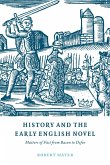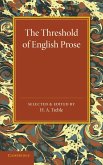Examines the role of the passions in the rise of the English novel.
This new study examines the role of the passions in the rise of the English novel. Geoffrey Sill locates the origins of the novel in the breakdown of medical and religious dogmas prior to the eighteenth century, leading to a crisis in the regulation of the passions which the novel helped to address. He examines medical, religious and literary efforts to anatomize the passions, paying particular attention to the works of Dr Alexander Monro of Edinburgh, Reverend John Lewis of Margate and Daniel Defoe, novelist and natural historian of the passions. He shows that the figure of the 'physician of the mind' features prominently not only in Defoe's novels, but also in those of Fielding, Richardson, Smollett, Burney and Edgeworth. The 'rise' of the novel comes to an end when the passions give way at the end of the century to the more modern concept of the emotions.
Review quote:
"Provocative and useful..."
Eighteenth-Century Fiction
"The author especially excels in combining extraliterary texts and contexts with fiction, from which he draws new and often stunning conclusions."
Zeitschrift fuer Anglistik und Amerikanistik
Table of contents:
List of illustrations; Acknowledgments; Introduction: the passions and the English novel; 1. The physician and the mind from Zeno to Arbuthnot; 2. The heart, the Holy Ghost, and the ghost of Michael Servetus; 3. Alexander Monro and the anatomist's gaze; 4. Defoe and the natural history of the passions; 5. Crusoe in the cave: family passions in Robinson Crusoe; 6. The sinner, the saddler and the brewer's wife: three case studies in desire; 7. 'Surprised by his passions': the ghost of Servetus and the reverend John Lewis; 8. 'Mr Jones had somewhat about him': Henry Fielding and the moral sense; 9. Burney, Richardson, and the 'extirpation' of the passions; Epilogue: Belinda and the end of the origins; Appendix 1. Who was 'Betty'?; Appendix 2. Who was 'Sir Benjamin Hodges'?; Appendix 3. The history of the 'history of the life of Servetus', told in letters; Bibliography; Index.
Hinweis: Dieser Artikel kann nur an eine deutsche Lieferadresse ausgeliefert werden.
This new study examines the role of the passions in the rise of the English novel. Geoffrey Sill locates the origins of the novel in the breakdown of medical and religious dogmas prior to the eighteenth century, leading to a crisis in the regulation of the passions which the novel helped to address. He examines medical, religious and literary efforts to anatomize the passions, paying particular attention to the works of Dr Alexander Monro of Edinburgh, Reverend John Lewis of Margate and Daniel Defoe, novelist and natural historian of the passions. He shows that the figure of the 'physician of the mind' features prominently not only in Defoe's novels, but also in those of Fielding, Richardson, Smollett, Burney and Edgeworth. The 'rise' of the novel comes to an end when the passions give way at the end of the century to the more modern concept of the emotions.
Review quote:
"Provocative and useful..."
Eighteenth-Century Fiction
"The author especially excels in combining extraliterary texts and contexts with fiction, from which he draws new and often stunning conclusions."
Zeitschrift fuer Anglistik und Amerikanistik
Table of contents:
List of illustrations; Acknowledgments; Introduction: the passions and the English novel; 1. The physician and the mind from Zeno to Arbuthnot; 2. The heart, the Holy Ghost, and the ghost of Michael Servetus; 3. Alexander Monro and the anatomist's gaze; 4. Defoe and the natural history of the passions; 5. Crusoe in the cave: family passions in Robinson Crusoe; 6. The sinner, the saddler and the brewer's wife: three case studies in desire; 7. 'Surprised by his passions': the ghost of Servetus and the reverend John Lewis; 8. 'Mr Jones had somewhat about him': Henry Fielding and the moral sense; 9. Burney, Richardson, and the 'extirpation' of the passions; Epilogue: Belinda and the end of the origins; Appendix 1. Who was 'Betty'?; Appendix 2. Who was 'Sir Benjamin Hodges'?; Appendix 3. The history of the 'history of the life of Servetus', told in letters; Bibliography; Index.
Hinweis: Dieser Artikel kann nur an eine deutsche Lieferadresse ausgeliefert werden.








